The Council for the popularization of science of ASCR in cooperation the Philosophical institute of ASCR, organized a press conference and a lecture with Prof. Paul Konrad Liessmann, a well-known Austrian philosopher, awarded by the Austrian State Prize for Cultural Journalism in 1996 and Scientist Prize 2006 (2007).
Konrad Paul Liessmann was born 1953 in Villach. He is professor at the Institute of Philosophy at the University of Vienna and the editor of Zsolnay’s PHILOSOPHICUM LECH series.
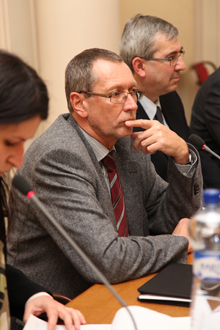

In your essay, you introduced the skeptical view of reforming a European higher education.
Could you summarize, why the Bologna process is so destructive?
One of the concrete points you have been criticizing is necessity of scientist's mobility. You have been arguing by Kant's example – he had lived in Konigsberg and had not written anything for ten years. Do you mean it as an exaggeration or is it meant seriously? In the past, the experience of students and teachers gained abroad was perceived positively – independently of Bologna process. Is Kant, incidentally, nothing but rarity?
The example of Immanuel Kant is obviously an ironic exaggeration. What I am getting at here is not only his lack of mobility, but the criteria in general that are used to evaluate academic achievement today. The example of Kant is an exception, but serves to demonstrate that excellent academic work cannot necessarily be evaluated at hand of quantitative criteria like the frequent change of universities or the number of publications. These are important considerations, but they must not be overestimated. Research quality can also be hampered by the pressure to publish or always be on the move.
The education is – according to your opinion – increasingly fragmented and particularized. Educational institutions do not educate independently thinking individuals, but irresponsible ones without their own thinking. How can this situation be changed?
This unfortunate development can in my opinion only be corrected by taking seriously the students' freedom and responsibility. Education is a process that every individual has to discover for him- or herself. While I recognize the importance of a fully organized, good vocational training, this is also about the education of people who can make their own judgments, take on social responsibility and recognize implications beyond their own, limited professional field. I believe that more flexible study regulations, more choices and freedom in the requirements will be as important in order to achieve such an education as the inclusion of general basics of philosophy, philosophy of science and political ethics on a high level in the curricula for every course of study.
What do universities symbolize nowadays? Has the idea of education changed in recent time?
As far as I can tell, education has undergone a fundamental change in the course of the last years and decades. Currently, education is all about the attainment of degrees and qualifications in order to stay in the competition. The humanistic concept of education as an idea of the development and maturing of a person into a personality has been forgotten – as has the idea that universities also ought to be hot spots of social development, where decisive questions of our time are impartially and critically studied, discussed and researched.
Why do the quantification and the evaluation increasingly affect science and research? Especially humanities – regarding to their character – suffer from the quantification…
Academic work obviously has to be evaluated. However, one must not forget that the academic system itself is the best evaluative method: Theories, hypotheses and ideas are published and taken up, criticized and developed by the scientific community. Further, one ought to keep in mind that the natural sciences and the humanities represent completely different cultures of knowledge, which have also developed different forms of discourse and evaluation. I dislike the way everything is being lumped together here when evaluation methods that have proved themselves in one culture of knowledge are simply applied to all others as well. Books, anthologies and monographs are still central organs in the humanities, hence the purely quantitative and bibliometrical methods that emerged out of the journal culture of the natural sciences simply do not suffice. Strong pressure of evaluation furthermore favors the main stream, mediocrity and conformist thinking, while real originality and creativity are not recognized in this system, and are often even hindered. I dare say that in the long term, the current forms of quantitative evaluation will not foster excellence, but mediocrity in research in the humanities. The decisive steps forward will have to be taken by outsiders who do not need to conform to the academic world – as was the case, by the way, already in the 19 th century: Think of Kierkegaard, Nietzsche, as well as Einstein.
Which way an independent scientist might exists in this system?
Wh at is the relationship among freedom and science? How dramatically the power and the prestige affect this relationship?
In your essay, you judge founding of the excellence centers for science and education as a negative step? What are the main reasons for your critic?
What type of critic reviews on your book do you hear most frequently? What is your general view of the future of education in Europe?
16.4.2010
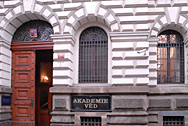



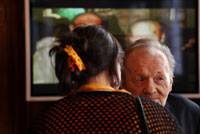

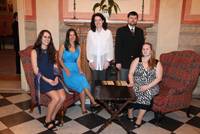
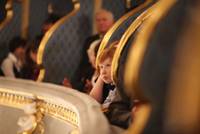



 English
English
